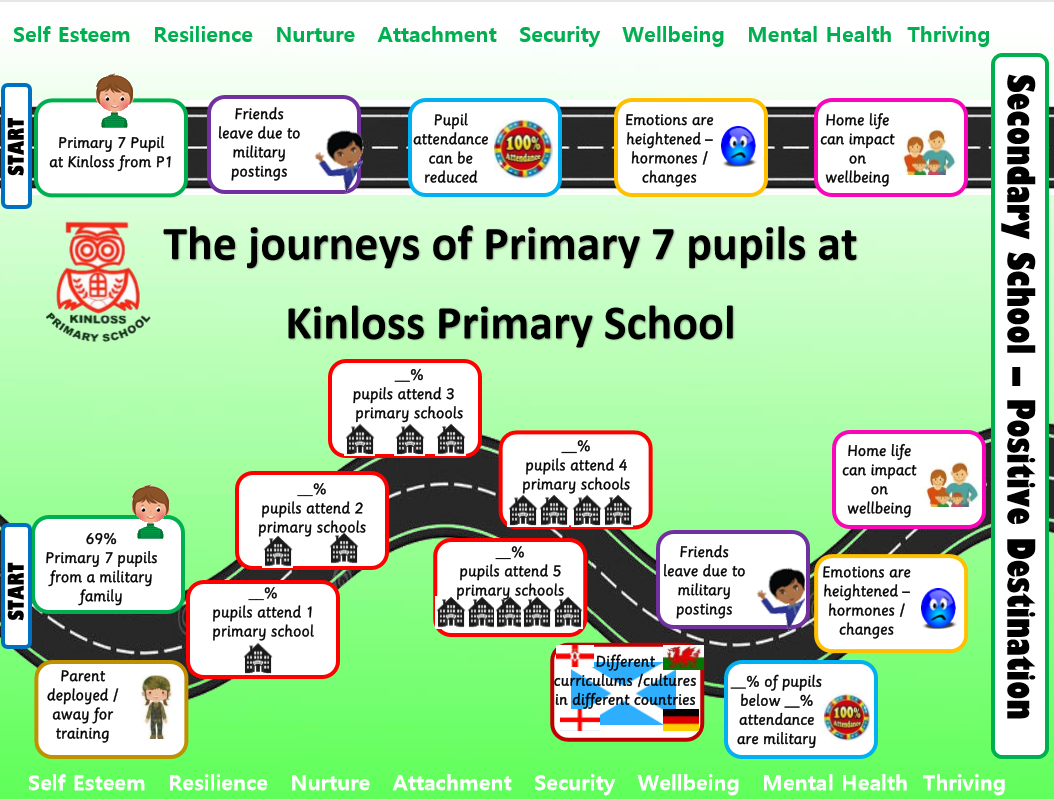Supporting children from Armed Forces families
Explore this exemplar
 The Armed Forces Good Practice Event took place on 13 May 2019. A series of presentations were given by representatives from the Armed Forces, Ministry of Defence (MoD), Scotland’s National Transition Officer and practitioners involved in working directly with Armed Forces (Service family) children in Scottish schools. The event provided opportunities to:
The Armed Forces Good Practice Event took place on 13 May 2019. A series of presentations were given by representatives from the Armed Forces, Ministry of Defence (MoD), Scotland’s National Transition Officer and practitioners involved in working directly with Armed Forces (Service family) children in Scottish schools. The event provided opportunities to:
- share learning and promote the embedding of good practice to enable support for Armed Forces families;
- support delegates to reflect on their practice and further develop their knowledge and understanding of supporting children from Armed Forces families;
- discuss the final round of the MoD Education Support Fund (ESF).
The event, hosted by Perth and Kinross Council, was facilitated by the Scottish Service Children’s Strategy Group (SSCG) and was supported by the Scottish Government, Ministry of Defence, Education Scotland, the Association of Directors of Education (ADES), and the Royal Caledonian Education Trust (RCET).
The MoD Education Support Fund (ESF)
Since 2011, the Ministry of Defence Directorate Children and Young People has invited bids to the Education Support Fund from publicly funded schools across the UK attended by Armed Forces children. The fund is aimed at supporting schools to mitigate the effects on children whose parents are subject to frequent mobility or deployment. Some schools have received this funding for projects and used the event to share their experiences prior to the fund closing next year.
The various projects and initiatives used in schools supported by the funding in Scotland have identified what makes a difference to Armed Forces (Service family) children. Interventions most frequently cited as having a positive impact on the wellbeing and educational progress of Armed Forces children were:
- developing good home-school links - supportive relationships with families;
- developing whole school and classroom nurturing approaches;
- use of Play Therapy, Mindfulness, and resources/programmes to support pupils who experience loss, change or separation;
- creating a responsive curriculum, tailoring timetables and offering enhanced transition supports;
- using targeted literacy and numeracy programmes to accelerate progress;
- offering 'whole family' support including supporting the wellbeing of parents.
The schools created posters to share their leaning journeys, developed resources and produced project impact and evaluations. These can support practitioners to reflect on and improve their support for Armed Forces children and their families within Scottish schools.
Downloads
Four posters from Kinloss Primary School, Moray, highlighting the use of data to both track pupil’s educational journey and progress and to plan and target support:
PDF file: Data to support Getting it right for every child (GIRFEC) (299 KB)
PDF file: Kinloss P1 Learner Journey (276 KB)
PDF file: Kinloss P4 Learner Journey (237 KB)
PDF file: Kinloss P7 Learner Journey (229 KB)
Two posters highlighting how Duncanrig Secondary School in South Lanarkshire is piloting support:
PDF file: Supporting Armed Forces Children (715 KB)
PDF file: Transition Teambuilding (794 KB)
Poster from the Forces Children's Education website
PDF file: Forces Children's Education website (627 KB)
Poster from Renfrewshire Bushes Primary School
PDF file: Renfrewshire Bushes Primary School - Supporting emotional resilience poster (271 KB)
Exemplar of a Welcome Booklet Armed Forces Families
Welcome Booklet: Argyll and Bute
Improvement questions
- Do we know who are our learners from Armed Forces Families – including regular, reserve and veterans?
- How do we know we are supporting our learners from Armed Forces Families effectively?
- What learning can we take from the practice examples to help our school to improve support for children from Armed Forces Families?
- How will we measure the impact of improvement?
